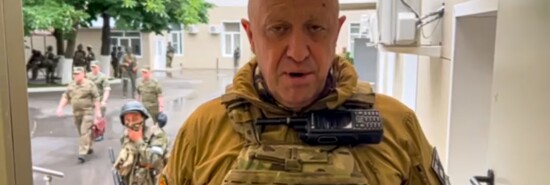
Wagner revolt is a wake-up call for US policy
Janusz Bugajski
Video Embed
The mutiny by the Wagner Group state-sponsored mercenary force has hastened the process of Russia’s state collapse. Chaos and confusion are spreading among the power elites in the midst of a losing war in Ukraine. Unfortunately, instead of planning for regime collapse and state rupture in Russia, Washington is standing on the sidelines as a neutral observer.
Wagner chief Yevgeny Prigozhin’s mutiny was designed to oust Defense Minister Sergei Shoigu and Chief of General Staff Valery Gerasimov. But it has delivered three major repercussions.
HOW THE SUPREME COURT COULD NEXT REIN IN THE BIDEN ADMINISTRATION
First, it exposed deepening divisions within Russia’s military and security structures, with many high-ranking officers not knowing who to support during the insurrection. Even after Prigozhin stepped down, there was no immediate sign of a military purge, indicating that lines of authority may be collapsing. It is possible that dissatisfaction with the Defense Ministry and military commanders runs deeper than the Wagner rebellion.
Second, the mutiny revealed Putin’s vulnerabilities when faced with an armed opponent who could approach the gates of Moscow virtually unopposed. This underscores that the Kremlin “power vertical” is brittle and that the military and security establishment cannot be trusted either to win a war or maintain state integrity. Russia’s security forces do not fully control the country if Rostov-on-Don can fall to a few thousand troops in a few hours and anti-regime Russian insurgents operate with impunity in Belgorod, Bryansk, and other regions bordering Ukraine.
Third, Prigozhin’s revolt has provided a significant lesson for emerging security service and political rivals seeking to oust Putin. It will also encourage an assortment of revolutionaries and insurrectionists inside Russia or waiting to enter Russia — including Russian nationalists and various nascent ethnonationalist and regionalist liberation movements.
Russia is a failed state where no institution seems to be fully in control. When power struggles escalate at the center, Moscow will be hard-pressed to control the entire country. Similarly to the 1991 Soviet revolts, during the Wagner rebellion many republican and regional leaders stood on the sidelines to see who would prevail in the struggle for power. At some point they may seek to build their own private armies to maintain order and buttress their local control. Thousands of demobilized troops returning from Ukraine with weapons in hand to a deteriorating economy and disdainful of leaders in Moscow can be recruited to defend numerous republics and regions. Even Ramzan Kadyrov, the alleged Putin loyalist who already possesses his own military forces, can switch sides and re-declare the independence of Chechnya.
CLICK HERE TO READ MORE FROM THE WASHINGTON EXAMINER
While Western capitals should not openly support any military faction in Russia’s escalating conflicts, the message should not be one of fear of state collapse. Such paranoia will actually help Putin to try and preserve power and continue with the war in Ukraine. Washington needs to broadcast a clear and positive message to Russia’s citizens during the rupture process, with three main ingredients.
First, the U.S. seeks an end to the war in Ukraine, and this will only happen with a change of regime in Moscow. Otherwise, Russia’s losses will be monumental, and the state could disintegrate violently. Second, Washington supports pluralism, federalism, and the autonomy and self-determination of republics and regions. This can provide hope of viable alternatives for citizens in the midst of uncertainty, chaos, and conflict as the authoritarian state breaks down. And third, the U.S. is willing to work with any governments and entities that emerge from post-Putin Russia that will disassociate themselves from Moscow’s imperial project and seek cooperative relations with neighbors and Western states. Without a clear policy and strategy, Washington will simply be chasing shadows in Russia.
Janusz Bugajski is a Senior Fellow at the Jamestown Foundation in Washington DC. His recent book is Failed State: A Guide to Russia’s Rupture. His forthcoming book is titled Pivotal Poland: Europe’s Rising Strategic Player.
